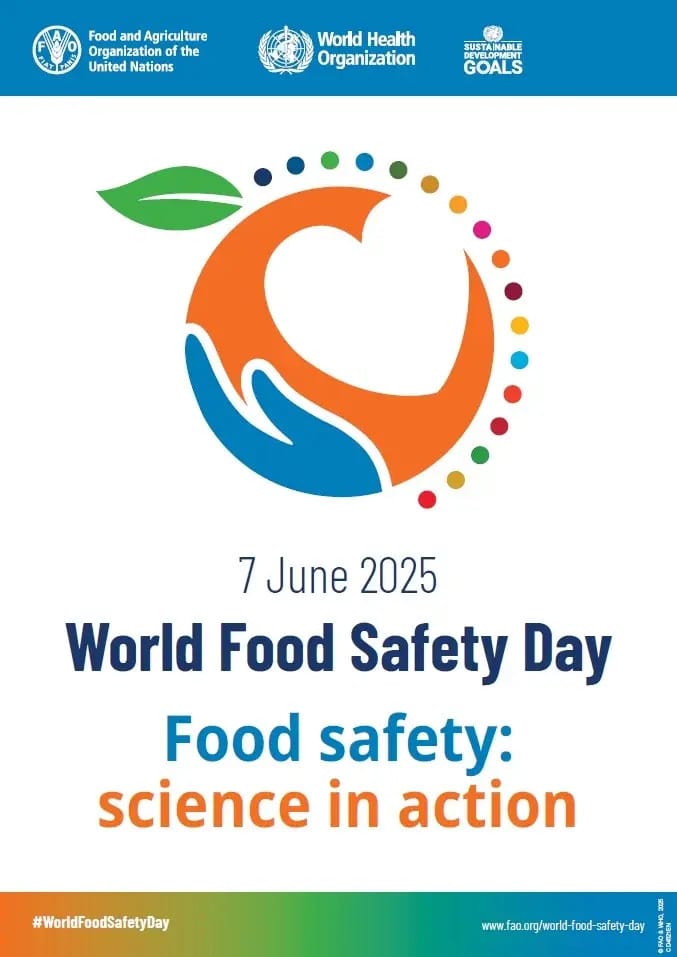Hi FSN Daily readers — welcome to this week’s Weekend Edition!
Today is World Food Safety Day, June 7, and this year’s theme — “Science in Action” — reminds us that science shapes everything from food labels to kitchen hygiene.
This week, we asked: “What’s the one thing everyone should know to stay safe in the kitchen?”
Your answers highlight key concerns and where science can make a difference. Let’s dive in!
Poll Results
What’s the one thing everyone should know to stay safe in the kitchen?
🍖 Cross-contamination risks — 44%
📅 Food date label confusion — 33%
❄️ Proper storage temperatures — 15.5%
🥜 Hidden allergens — 7.5%
Your votes show cross-contamination and food date labels are top of mind, reflecting areas where science-driven education can bridge knowledge gaps.
Cross-Contamination Risks
Cross-contamination topped your list of kitchen safety concerns.
One reader warned, “People don’t realize bacteria spread easily — from raw meat to utensils to sink handles.”
A 2023 USDA FSIS study found that spice containers are often overlooked, with 48% showing contamination during meal prep involving raw meat. Proper handling, like sanitizing containers after use, can mitigate this risk.
Another reader noted overlooked risks: “Folks focus on raw meat but miss dangers in handling melons or leafy greens if not properly sanitized.”
Science backs this up: studies show Salmonella and E. coli can linger on produce surfaces if not cleaned properly. Proper sanitization and separate cutting boards are key to reducing risks.
While cross-contamination topped the poll, many of you also voiced frustration with food date labels — another area where science and clarity are sorely needed.
Food Date Labels
Readers called for standardized, science-based labeling to cut confusion and waste.
“Labels should be clear on when food really expires, especially after opening,” one said.
Another added, “Not understanding dates leads to so much food waste.”
Research on microbial growth and shelf-life testing can inform clearer labels, ensuring safety and reducing waste.
The USDA is working on standardizing terms like “use by” and “best by.”
Next up, proper storage temperatures sparked passionate responses about outdated habits.
Proper Storage Temperatures
Many of you noted a lack of awareness about safe storage.
“Some still think it’s fine to leave food out for hours,” one reader said.
A retired chef emphasized, “Food temps aren’t taught enough — they’re a leading cause of illness.”
The FDA recommends keeping refrigerators at or below 40°F (4°C) and freezers at 0°F (-18°C) to prevent pathogen growth. Education grounded in science can correct risky habits.
Allergens, while less cited, inspired strong feedback about transparency.
Readers with allergies stressed the need for better labeling. “Companies are lax — we need to know what’s in our food!” one wrote. Another raised concerns about soy milk, citing potential health risks and calling for alternatives like almond or oat milk in schools.
Advances in food chemistry and stricter regulations, like those for the “Big 9” allergens, are critical to protecting consumers. Clear labels and rigorous testing can prevent tragedies and recalls.
We covered allergens in depth two weeks ago:
World Food Safety Day
This World Food Safety Day, we celebrate science’s role in keeping food safe. From pathogen research to allergen detection, science drives the guidelines that protect our kitchens. Your responses highlight where more education is needed — whether it’s sanitizing produce or understanding “best by” dates.
The World Health Organization (WHO) notes that science-based practices can reduce illness, cut costs, and save lives.
What’s Your Take?
Have a food safety tip or story? Share it — we love hearing from you!
(Keep it respectful; personal attacks or ads will be removed.)
Thanks for sharing your insights. As we mark World Food Safety Day, let’s keep learning, asking questions, and putting science into action — in our kitchens and beyond.
Jonan Pilet,
Newsletter Editor
Weekend Poll
🌍 What inspires you most to care about food safety?
Past Week’s Recalls
U.S. Recalls
Canadian Recalls
Don’t forget…
Do you know someone who would like this newsletter? Share it with them.
Interested in reaching food safety-conscious readers like you? To become a Food Safety News partner, apply here.


